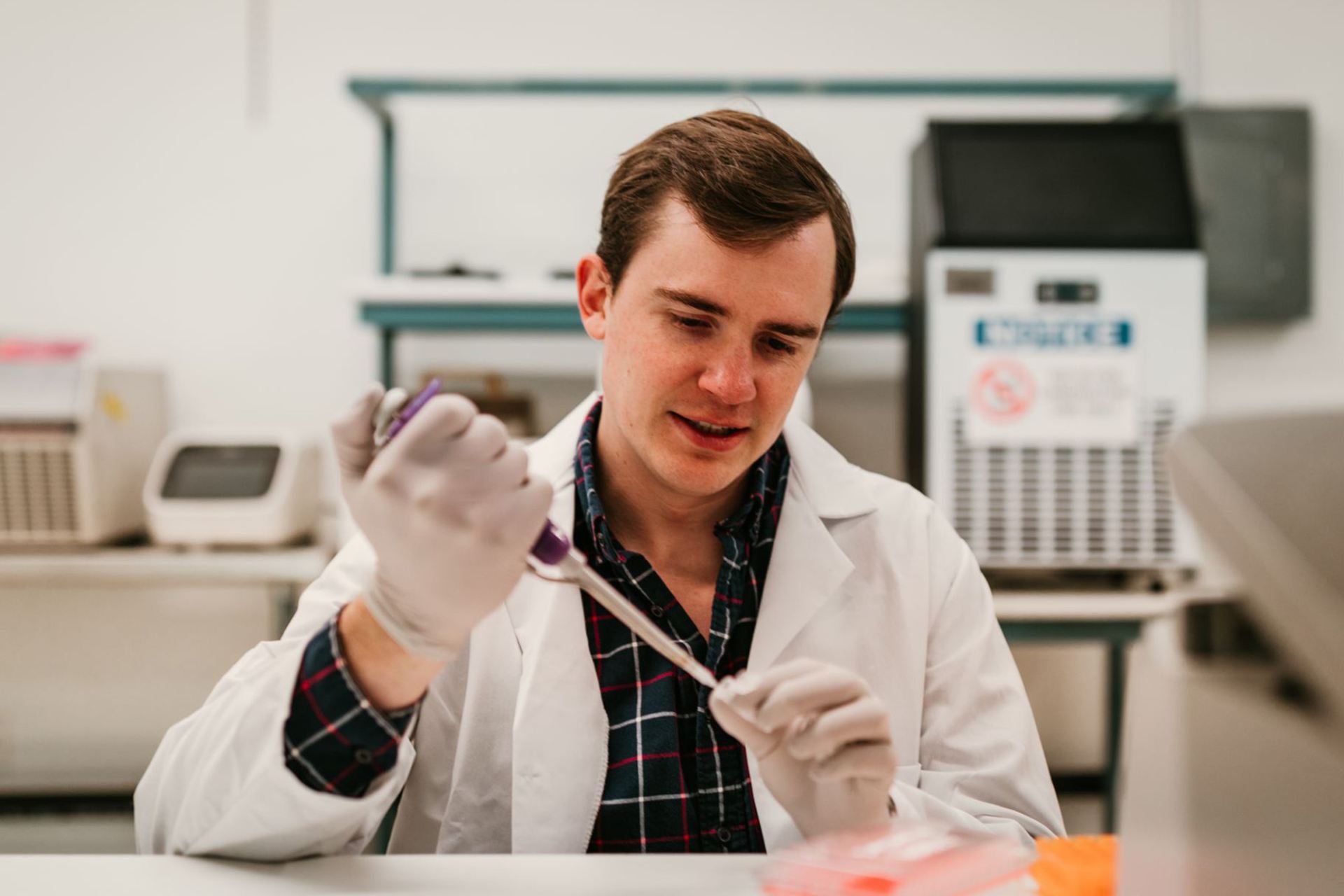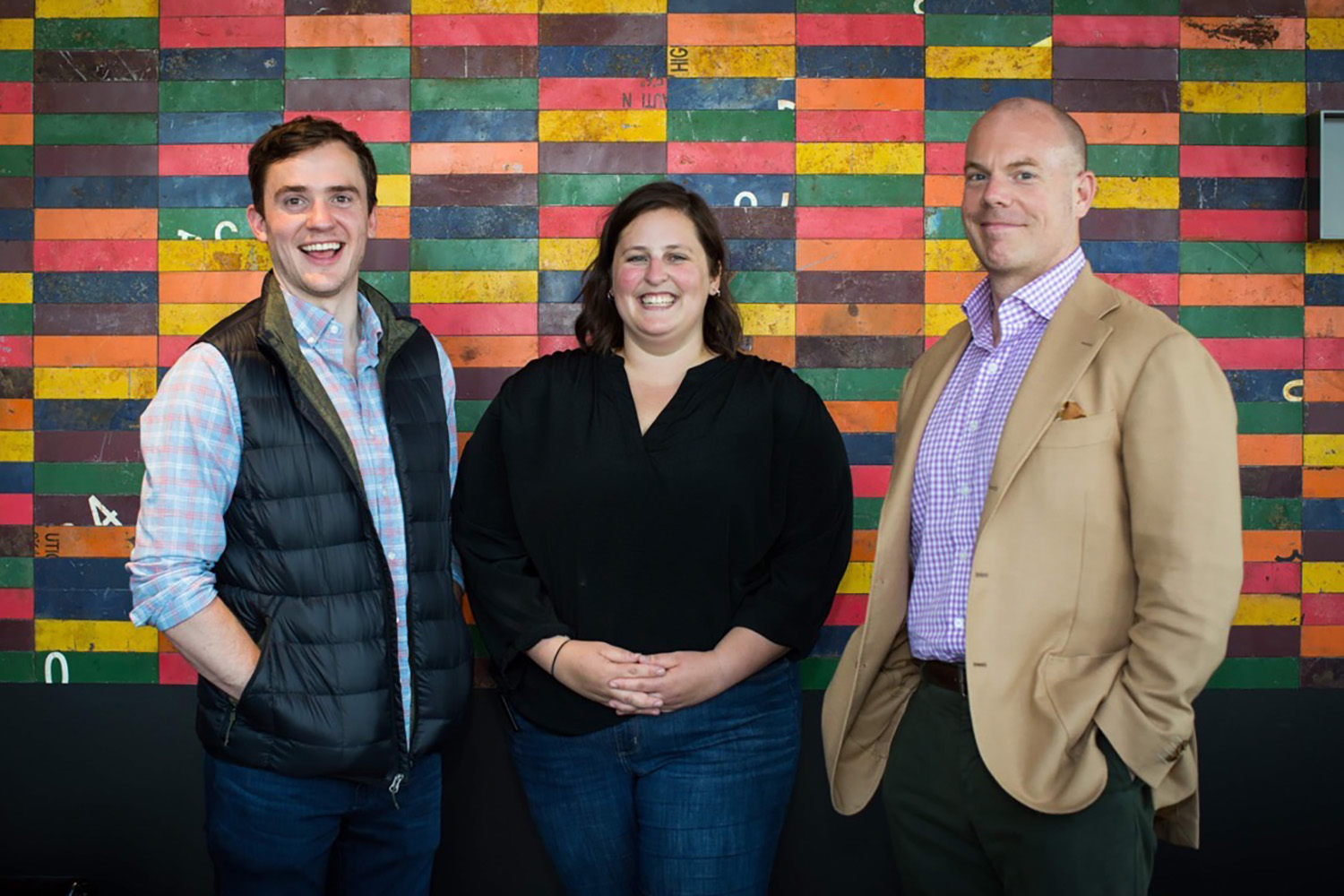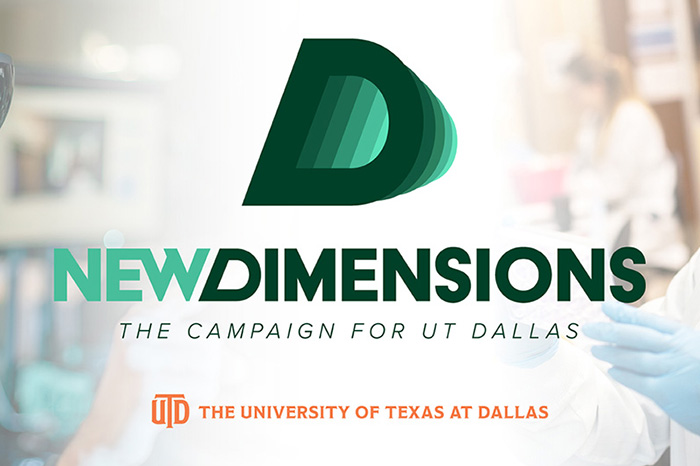
By the time he had completed his degree at The University of Texas at Dallas, Jackson Brougher PhD’22 was already putting his research to work.
Brougher’s passion for science and keen grasp of entrepreneurial innovation led him to help co-found pharmacology startup Doloromics, where he serves as chief scientific officer. The company is developing UT Dallas research into novel drug treatments for people with limited options to treat their chronic pain.
Brougher is quick to credit faculty, colleagues and his training from the School of Behavioral and Brain Sciences for preparing him.
“I’ve always had the dream of being a scientist and doing what I’m doing now, and it’s still just wild to me how this opportunity fell into my lap,” Brougher said.

Brougher studied with Dr. Catherine Thorn, assistant professor of neuroscience, investigating how learning-related neural activity supports motor function and behavioral improvement. Brougher published his research in a scientific journal for the first time while working in Thorn’s lab.
“When you see your name on the top of that first publication, you feel an immense sense of calm,” Brougher said. “Finally, after months of peer review and editing, your publication is out in the world, and it’s time to actually show others what you’ve done.”
Brougher first studied neuroscience at the University of Aberdeen in Scotland, where he received a Master of Science via an integrated five-year undergraduate and master’s program. As part of his studies, he also spent time working in a pharmacology lab at the University of Tübingen in Germany.
“I chose to study abroad because I was curious and wanted to see the world,” he said. “Science, like most other things, has become incredibly more international, and I loved working on interdisciplinary cross-cultural teams in the lab that exposed me to a wider range of viewpoints.”
When it came to choosing a PhD program, Brougher returned to his home state of Texas. He said he was drawn to UTD’s strong science and research foundation, particularly in neuroscience. Another plus was the University’s focus on translating research into commercial products.
“I’ve always had the dream of being a scientist and doing what I’m doing now, and it’s still just wild to me how this opportunity fell into my lap.”
Jackson Brougher PhD’22
Soon after arriving on campus in 2018, Brougher heard Dr. Ted Price BS’97, Ashbel Smith Professor of neuroscience and founding director of the Center for Advanced Pain Studies, speak on the practical value of research spun off into startup companies and fueled by private investment.
“It instantly clicked with me,” Brougher said. “Dr. Price talked about his past startups and how, as we develop our academic skill sets, this is something we should consider.”
Pain research in Price’s UT Dallas lab became the foundation of Doloromics. The company’s co-founders included Price, who is vice president of innovation for the company, and his former student Candler Paige PhD’21, who is now CEO, along with Dr. Chris Flores, president and chief research and development officer.
Paige invited Brougher to join the venture as a founding partner.
“We were PhD students at the same time, and I knew Jackson was a fantastic neuroscientist,” Paige said. “He’d given department talks where it was clear he was a thoughtful, skilled scientist. In addition to being a great scientist, I knew he was a good person. The advice everyone gives when thinking about founding a company with someone is to make sure you’re willing to work with that person every day for the next 10 years. Ted Price and I both knew we’d be OK with that person being Jackson.”
Doloromics is working to develop precise drug targets to treat chronic pain without using the opiates that have led to an epidemic of prescription drug addiction.
“Opiates mask the symptoms of pain but don’t directly target the underlying mechanisms of what’s causing pain,” Brougher said. “We’re focusing on what causes certain sensory neurons in the peripheral nervous system to be hypersensitized to stimuli that typically wouldn’t result in pain.”

To learn how UT Dallas is attracting the best and brightest students, explore New Dimensions: The Campaign for UT Dallas.
Brougher is studying the human transcriptome in human tissue, which is the total of all RNA genes expressed. Through gene sequencing and analysis, he is seeking to identify the mechanisms of pain behind specific sensory neurons, with the goal of developing drug therapies focused on individual types of sensory neurons.
“Jackson has single-handedly grown our platform, DOLOReS, from a good concept into an unstoppable tool,” Paige said. “He’s sequenced millions of cells, something almost no one else in the world can say, and processed that data in a record amount of time. He’s been instrumental in identifying novel therapeutic targets, and then validating them in an in-vitro screening platform he single-handedly built.”
In 2020 Doloromics was accepted into a startup accelerator begun by the California genetics technology company Illumina Inc., which Brougher describes as “the Microsoft of the gene-sequencing world.” Doloromics received access to seed funding, use of the company’s sequencing equipment and lab space that made Doloromics’ early work in transcriptomic analysis possible.
Doloromics is now established in Menlo Park, California, in the heart of Silicon Valley. Initially employing just the four co-founders, the company is expanding its research efforts and hiring staff and laboratory scientists.
“Now I’m sitting in our office here at Doloromics and right outside is our lab, which is wild,” Brougher said. “Every morning I walk up and unlock the door, and I’m in this space that I helped create. It’s a struggle sometimes, but I love proposing crazy ideas to potential investors, and some of those people look you in the eye, and your crazy idea clicks with them, and they’re like, ‘Yes, I’m on board!’”
